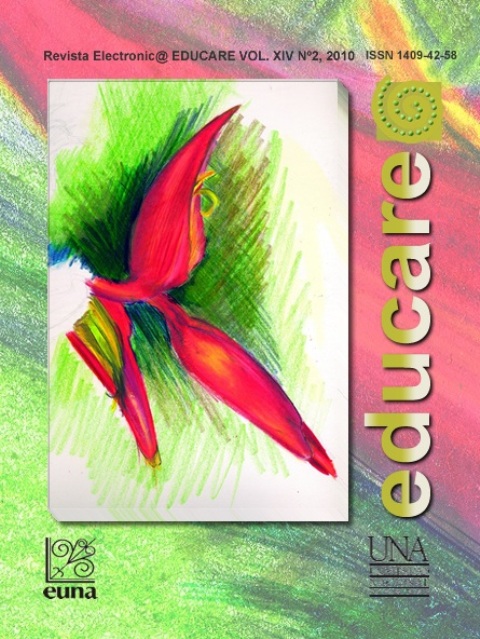Sensitization and Disposition to Change Facing the Challenges of the New Educational Circumstances
DOI:
https://doi.org/10.15359/ree.14-2.12Keywords:
teacher trainers, neuroscience, pedagogical transformationAbstract
This article is about the necessity of an up to date vision in teachers’ training. It starts with the latest studies and advances surrounding learning-along-life term. It presents a set of topics inspired in the contributions of new fields of study connected to learning. Such contributions, as neuroscience, should be considered in the decisions related to future teachers’ training, thus favoring the transformation of the pedagogical practice. Awareness and disposition to change are essential requirements for teacher trainers who will drive investigative processes and pedagogical proposals generation; all of this according to the new and dynamic knowledge society.
References
Coronado, L., Goñi, A., Meza, J., Vargas M., Francis, S. (2009). Síntesis del Análisis de Problemas
y Retos de la Formación Docente en el marco de la pedagogía actual. [Curso: Actualización
Pedagógica de Formadores de las Carreras de Educación de las Universidades Estatales].
Recuperado el 7 de mayo de 2010, de http://campusvirtual.uned.ac.cr/lms/mod/resource/view.
php?id=5860
Hospers, J. (1976). Introducción al análisis filosófico. Barcelona: Alianza.
Latapí, P. (2003). ¿Cómo aprenden los maestros? [Conferencia Magistral en el XXXV aniversario
de la Escuela Normal Superior del Estado de México. Toluca, 18 de enero de 2003.
En Secretaría de Educación Pública de México. (2003)] . Cuadernos de Discusión 6, 1-28.
México: Secretaría de Educación
Pichardo, M. C., García, A. B., De la Fuente, J. y Justicia, F. (2007). El estudio de las expectativas
en la universidad: análisis de trabajos empíricos y futuras líneas de investigación. Revista
Electrónica de Investigación Educativa, 9(1). Consultado de http://redie.uabc.mx/vol9no1/
contenido-pichardo.html
Ratey, J. (2003). El cerebro. Manual de instrucciones. Barcelona: Random House.
Downloads
Published
How to Cite
Issue
Section
License
1. In case the submitted paper is accepted for publication, the author(s) FREELY, COSTLESS, EXCLUSIVELY AND FOR AN INDEFINITE TERM transfer copyrights and patrimonial rights to Universidad Nacional (UNA, Costa Rica). For more details check the Originality Statement and Copyright Transfer Agreement
2. REUTILIZATION RIGHTS: UNA authorizes authors to use, for any purpose (among them selfarchiving or autoarchiving) and to publish in the Internet in any electronic site, the paper´'s final version, both approved and published (post print), as long as it is done with a non commercial purpose, does not generate derivates without previous consentment and recognizes both publisher's name and authorship.
3. The submission and possible publication of the paper in the Educare Electronic Journal is ruled by the Journal’s editorial policies, the institutional rules of Universidad Nacional and the laws of the Republic of Costa Rica. Additionally, any possible difference of opinion or future dispute shall be settled in accordance with the mechanisms of Alternative Dispute Resolution and the Costa Rican Jurisdiction.
4. In all cases, it is understood that the opinions issued are those of the authors and do not necessarily reflect the position and opinion of Educare, CIDE or Universidad Nacional, Costa Rica. It is also understood that, in the exercise of academic freedom, the authors have carried out a rogorous scientific-academic process of research, reflection and argumentation thar lays within the thematic scope of interest of the Journal.
5. The papers published by Educare Electronic Journal use a Creative Commons License:














 The articles published by Educare Electronic Journal can be shared with a Creative Commons License:
The articles published by Educare Electronic Journal can be shared with a Creative Commons License: 



